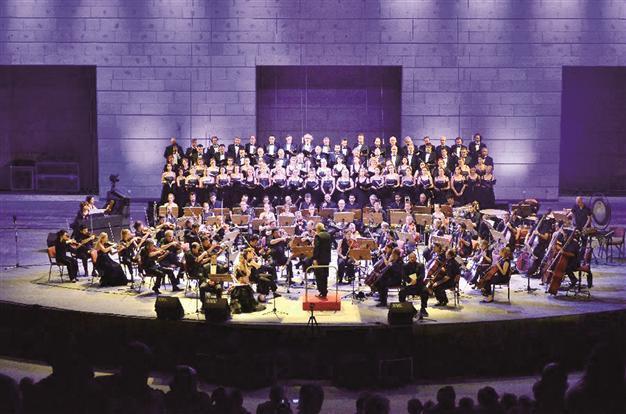Much-debated Carmina Burana performed uncensored
Banu Şen – İzmir

The world-renowned “Carmina Burana” was staged on May 18 without any scene cuts or censorship, following a planned staging in İzmir on May 2 which was postponed due to “technical reasons,” after prominent Turkish pianist and composer Fazıl Say’s wrote an article on the piece containing sections about “sex and wine.”
Carmina Burana, composed by German Carl Orff, was put on stage in its uncut form on the Elhamra Stage in İzmir by the İzmir State Opera and Ballet (İZDOB) on May 18.
The piece was set to be staged at İzmir’s Ahmed Adnan Saygun Arts Center on May 2 but was postponed to May 18 after Say’s article was published on daily Cumhuriyet. Say’s remarks had come in response to the removal of his own piece in favor of Carmina Burana in the Antalya Symphony Orchestra’s program, daily Cumhuriyet had reported.
Say wrote an op-ed for daily Cumhuriyet on April 29, entitled “Culture Ministry, Wine and Sex,” about how Carmina Burana’s Latin words were on wine, sex and passion. The article appeared after the Antalya Symphony Orchestra had removed Say’s “Nazım Orotorio” from its program and replaced it with Carmina Burana.
The piece was initially reported to have been cancelled before the İZDOB released a statement saying it had been postponed.
Haldun Özörten, the İZDOB main director, told daily Hürriyet after the performance that they had finished the piece without any problems.
“We ended the performance without any problems. There was actually no need for such discussions. We continue our work. The audience also left the performance satisfied,” Özörten said.
Say has recently been at odds with the government and the supporters of the ruling Justice and Development Party (AKP).
Say received a suspended 10-month prison sentence in April on charges of “insulting the religious beliefs held by a section of society” for re-tweeting several lines that have been attributed to medieval Persian poet Omar Khayyam.
Three of Say’s pieces were removed from the program of the Culture and Tourism Ministry’s Presidential Symphony Orchestra (CSO) in the 2014-2015 season. The orchestra wanted to replace Say’s works with the works of another famous Turkish composer, Muammer Sun. However, in reaction to the CSO’s decision against Say, Sun refused the orchestra’s request to play his works.
Say, who had previously been the art director of the International Antalya Piano Festival, was replaced by conductor Gürer Aykal in 2014.
 The world-renowned “Carmina Burana” was staged on May 18 without any scene cuts or censorship, following a planned staging in İzmir on May 2 which was postponed due to “technical reasons,” after prominent Turkish pianist and composer Fazıl Say’s wrote an article on the piece containing sections about “sex and wine.”
The world-renowned “Carmina Burana” was staged on May 18 without any scene cuts or censorship, following a planned staging in İzmir on May 2 which was postponed due to “technical reasons,” after prominent Turkish pianist and composer Fazıl Say’s wrote an article on the piece containing sections about “sex and wine.”